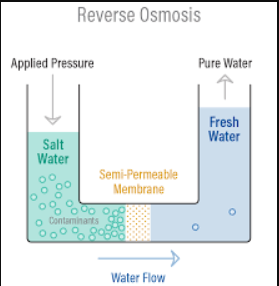
One of the greatest filter kinds available is reverse osmosis, which is frequently praised. You’d be excused for believing an RO filter could do anything, from providing great-tasting water to contaminant removal.
And while reverse osmosis filters are a very efficient way to remove many various sorts of pollutants and toxins from water, there are some circumstances in which they excel as well as others in which other techniques of filtration may result in superior overall water quality.
We are all aware that an RO plant is able to deliver clean water. But if you are curious to know what RO plants cannot remove then we are at the rescue. Come learn about the same with us
Reverse osmosis:
It’s critical to comprehend how reverse osmosis functions in order to comprehend what is not eliminated by the process as well as the overall advantages and restrictions of a RO system.
The fact that RO systems operate at the molecular level and have a filter membrane that is so tiny that only water molecules may flow through it is one of their advantages. You usually get some of the cleanest, purest water possible as a result of this process. It is not always a foolproof water treatment method, though.
What does reverse osmosis not remove?
Reverse osmosis isn’t always the panacea many people expect when it comes to providing water that is entirely free of impurities because there are some contaminants that are molecularly smaller than water. As an illustration, the following contaminants frequently bypass standard RO filters:
Pesticides \Herbicides
Numerous other agricultural treatment items, such as fungicides
Some dissolved gases, such as hydrogen sulphide
A few organic substances
Chlorine — RO may remove varying amounts of chlorine, but it’s possible that the typical household RO filter won’t be able to remove all of the chemical from the water. This will mostly rely on the chemical’s concentrations in the water supply.
Can bacteria be removed by reverse osmosis?
The majority of microorganisms may be effectively filtered out using reverse osmosis technology. However, like with other filtering systems, RO requires frequent filter replacement and proper installation in order to properly eliminate microorganisms.
Fluoride Removal via Reverse Osmosis
Reverse osmosis will successfully filter out fluoride because fluoride molecules are bigger than water molecules. Once more, the RO filter’s efficacy still depends on regular cleaning and maintenance.
RO Filtration’s advantages and limitations:
A fantastic initial step in domestic household water purification is reverse osmosis. Additionally, RO can remove bothersome dissolved hard minerals as well as the most dangerous toxins, such as lead, arsenic, and other heavy metals, from common public water sources.
However, it’s vital to keep in mind that RO treatment might take some time because of the way it works (water is driven through several membrane layers in a number of steps). This may not be a long-term reliable or dependable solution for large homes or businesses. When contemplating RO filtering for the home or workplace, capacity is one of the crucial restrictions to take into account.
In any situation, it’s crucial to start with a water test to find out what’s in your water in order to acquire the best answer for your water treatment needs. It’s crucial to know not only what pollutants your water may have (such as calcium, iron, and chlorine) but also how much of them there may be, especially for reverse osmosis systems. You’ll be in a better position to choose the best water filter for you once you understand the types of contaminants that are a concern for your particular home and their typical levels in your water supply.
Conclusion:
The Netsol water solutions’s RO system has several stages of filtration and a number of filter choices, and it is certified to minimise 60 pollutants. You can measure water use and pollutant reductions thanks to Netsol water solutions. Reduced consumption of single-use plastic water bottles also results in cost savings and bottle saves.
However, installing an RO system at the point of use guarantees that you may take use of reverse osmosis water’s advantages whenever you choose. Once it’s up and running, all you have to do is open the faucet to get great-tasting water for cooking, drinking, and brewing tea and coffee right from the kitchen sink.
If you are curious to know more about anything about RO plants, feel free to contact us an at +91-9650608473 or enquiry@netsolwater.com.
